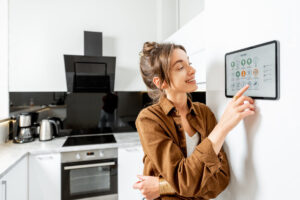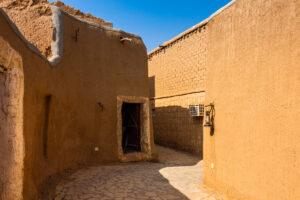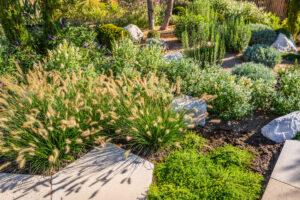











RIYADH: The concept of sustainable living has gained significant traction in recent years as individuals and communities strive to reduce their environmental impact.
In Saudi Arabia, where rapid urbanization and economic growth have led to increased energy consumption and waste, the importance of adopting green living practices cannot be overstated.
The first thing that people should be aware of is electricity consumption and energy conservation. By investing in solar technology, homeowners can reduce their reliance on non-renewable energy sources and lower their electricity bills in the long run.
According to Thaer Qasem, senior energy engineer at SETS Saudi Arabia, a leading multidisciplinary engineering and consulting firm, Saudi Arabia’s residential sector consumed more than 47 percent of the total electricity produced in 2022.
Home cooling accounts for the largest share of that residential consumption and may reach up to 70 percent of that share, while lighting and other household appliances account for the rest.

“When designing or buying a new home, it is important to consider the insulation levels of walls and windows,” Qasem told Arab News. “The choice of building orientation can also increase natural light and help reduce heat absorption.
“To add value to your home, you may want to consider incorporating renewable energy systems like solar thermal units to heat domestic water and PV systems to generate electricity.
“Other techniques include purchasing equipment with a high-energy efficiency label and setting the AC temperature to at least 23 C.”
He added: “Smart home appliances and tools also provide excellent tools for conserving energy, allowing us to better monitor and control our usage and energy efficiency.”
Integrating smart home technology for monitoring and controlling energy usage allows residents to optimize their energy consumption and identify areas where efficiency can be improved.

Proper insulation, sealing, and the use of efficient HVAC (heating, ventilation and air conditioning) systems are also essential in preventing energy waste and maintaining a comfortable indoor environment, especially during the sweltering summer months.
Similarly, using recycled glass in countertops or tiles not only diverts waste from landfills but also reduces the energy required to produce new materials.
Also, selecting building materials with low volatile organic compounds can help maintain good indoor air quality, which is particularly important in a region like Saudi Arabia where individuals spend a significant amount of time indoors due to extreme temperatures.
By choosing green building materials, homeowners can not only lower their energy consumption and carbon footprint but also create healthier living spaces for themselves and their families.
Khalid Al-Harbi, an architect based in Riyadh, said a common misconception around sustainability is that it relies solely on the energy systems, equipment, and material choices used in the building. However, he believes a good design is an efficient design.
“A well thought out architectural design that studies the needs of the users and considers the environmental factors will significantly reduce the cost and energy use of the building,” Al-Harbi told Arab News.
“Through studying the solar orientation of the sun in both summer and winter, we can decide on the most efficient placements of the windows and the shading systems needed such as exterior screens, outdoor shades, curtains, and so on, throughout the building.”
He continued: “We must also understand how the users will use the building and consider their need for natural lighting, as well as their privacy. We manage to achieve a good balance between maximum amount of natural light and privacy by incorporating inner courtyards, skylights, and windows with screens.”
Clay walls have emerged as a popular choice for eco-conscious homeowners due to their numerous benefits, including natural insulation properties, humidity regulation, and sustainability.
According to Adam Weismann, founding director of Clayworks and Claymoon, a business that has participated in numerous projects in Saudi Arabia, including the Red Sea International Airport and the King Faisal Cultural Center, clay is a sustainable, non-toxic alternative.

“From a sustainability perspective, clay has a very minimal carbon footprint because it is a pure substance with no chemicals,” Weismann told Arab News.
“Additionally, from a toxicity perspective, there is nothing that clay can truly release into the atmosphere. Thus, using it is a highly healthy and beneficial solution.”
Saudi Arabia is renowned for its clay houses, which fit seamlessly with the Kingdom’s natural aesthetic. Traditional architecture has long used sun-dried clay blocks, which remain cool during hot weather and release heat during the late hours when the temperature drops.
“Since not everyone lives in a large home, apartments can also use clay walls and ceilings,” said Weismann. “Paint would be completely omitted and clay would typically be used instead. It has all the advantages of that, including helping to absorb toxins.
“However, on a broader level, simply considering the materials you’re using and what you’re doing creates a small safe haven inside a larger apartment building where perhaps not as much thought was put into the materials.”
Weismann also proposed using clay under flooring with clay boards, which could be fitted with pipes carrying cool water, as an environmentally friendly alternative to air conditioning.
“Consequently, the building is being cooled by the cold water you are pushing through. That’s something I’d really like to explore in Saudi Arabia because I believe it would be beneficial for an eco-friendly home or apartment,” he added.
In addition to using sustainable materials, implementing energy-efficient strategies is key to creating eco-friendly homes in Saudi Arabia.
One effective approach is the installation of solar panels or solar water heaters to harness the abundant sunlight in the region and generate renewable energy for household needs. Saudi Arabia has an abundance of solar energy due to its hot climate.
“However, a government incentive is needed to push people towards incorporating solar panels in their homes,” said Al-Harbi. “Many countries offer subsidies to their citizens where they help with 30-70 percent of the cost of solar systems.
“The incentive programs are usually done with tax credits, lowering bills, low interest loans, etc. We’re confident that these types of programs will soon be implemented in the country.”
Part of the battle will be changing consumer behavior. Qasem believes raising awareness among families, including children, is essential to make effective energy savings.
“Various easy methods make a big difference,” he said. “Turning off lights and AC when not needed, closing the windows and doors to conserve energy, using the washing machine at full capacity only, and using sunlight to your advantage are just a few.”
When it comes to constructing eco-friendly homes in Saudi Arabia, the choice of building materials plays a crucial role. Opting for sustainable materials such as bamboo, recycled glass, and reclaimed wood can significantly reduce the environmental footprint of a home.
For instance, bamboo is a fast-growing renewable resource that can be harvested without causing deforestation, making it an ideal alternative to traditional hardwoods.

According to Al-Harbi, what makes a material sustainable is its abundance in nature and the size of its carbon footprint — the amount of energy and carbon emissions required to produce and transport it.
“While bamboo is a much more sustainable material, the use of local materials might be a more eco-friendly option,” said Al-Harbi.
“We are hoping that with the industrial boom the country is going through, we will see more local factories that produce recycled materials — glass, aluminum, and plastics — and eco-friendly building materials like glass wool, made of recycled plastics, and sheep wool insulation.
“We would also benefit from finding innovative solutions to reuse materials from buildings that were recently demolished, instead of all the materials going to a landfill.”
Another aspect to consider is water efficiency. Water scarcity is a pressing issue in Saudi Arabia, making its conservation a critical aspect of green living.
Adopting water-efficient practices such as installing low-flow fixtures and water-efficient appliances can significantly reduce household water consumption.
“Most of the water conservation solutions come from increasing the awareness of the users to how much water they’re using,” said Al-Harbi.
“Metering devices that monitor the consumption of water might be very informative to the residents about how much water they’re using. Of course, using water-efficient fixtures and appliances will also help with reducing the water consumption as well.”
These simple upgrades not only help conserve water resources but also lower water bills for homeowners. Investing in rainwater harvesting systems for irrigation and non-potable water needs can further reduce reliance on municipal water sources.
By capturing rainwater and using it for landscaping or other non-drinking purposes, homeowners can contribute to water conservation efforts and reduce the strain on local water supplies.

Choosing drought-resistant plants for landscaping reduces the need for irrigation, promotes biodiversity, and enhances the overall sustainability of the home, while also preserving precious water resources for future generations.
By incorporating green building materials, energy-efficient strategies, and water conservation techniques, individuals can contribute to sustainability efforts and create healthier, more efficient living spaces.
However, Al-Harbi believes achieving a fully “sustainable building” is extremely difficult and rare. He said: “Unfortunately, the materials and technologies we currently have in Saudi Arabia, as well as the codes and zoning restrictions, do not allow us to design green homes yet.”
As the demand for sustainable practices continues to grow, it is essential for homeowners in Saudi Arabia to prioritize eco-friendly choices in their homes to mitigate environmental impact and promote a more sustainable future.
Embracing green living guidelines in homes in Saudi Arabia is not only beneficial for the environment but also for the well-being and finances of homeowners.